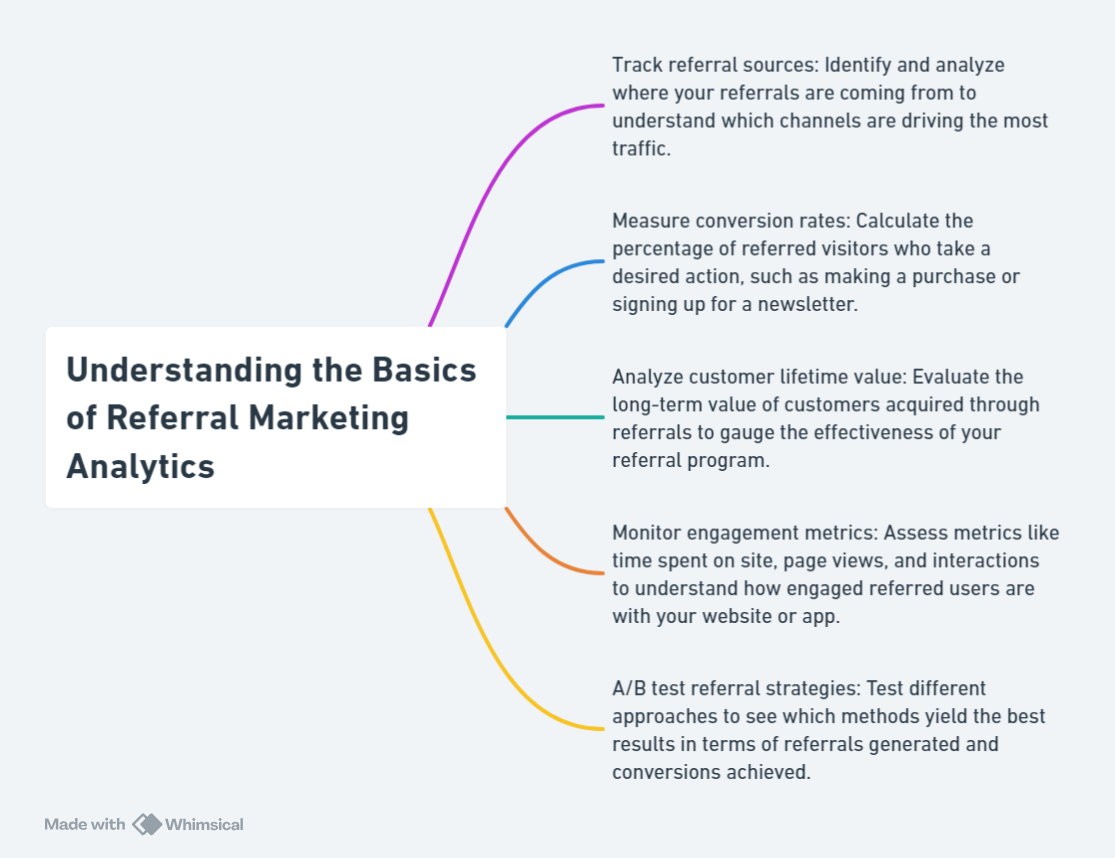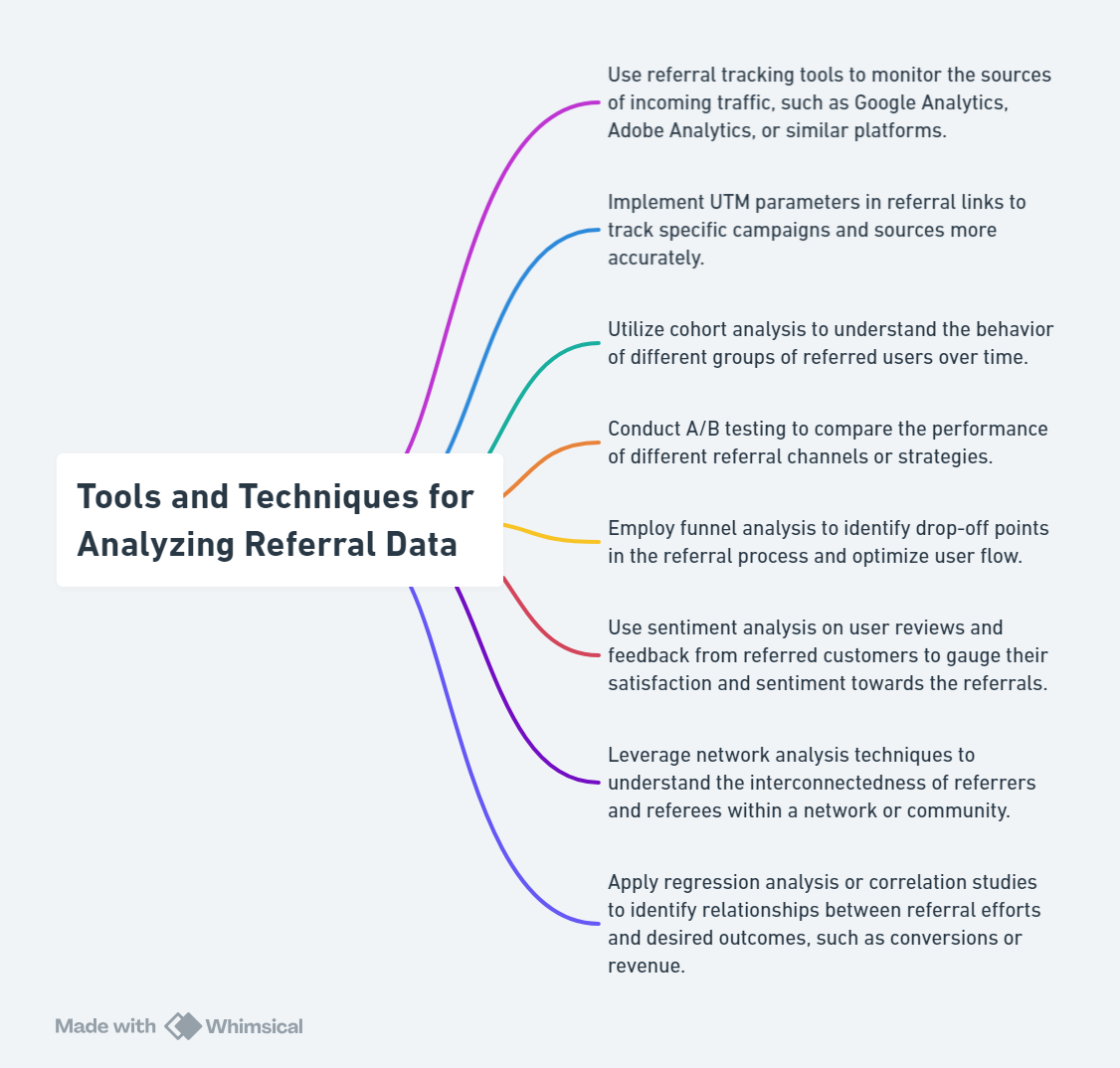Referral marketing analytics is the process of tracking, measuring, and analyzing the performance of your referral marketing campaigns. By understanding the key metrics to track and the tools and techniques for analyzing referral data, you can optimize your campaigns for success.
Understanding the Basics of Referral Marketing Analytics

Referral marketing analytics is a critical aspect of understanding and optimizing the performance of referral marketing campaigns. By diving deep into referral marketing analytics, businesses can uncover invaluable insights that drive smarter decision-making and strategic adjustments. This article is designed to shed light on the fundamentals of referral marketing analytics, guiding you through its importance, key metrics, implementation strategies, and common challenges.
1. The Importance of Referral Marketing Analytics
Referral marketing analytics plays a pivotal role in the success of referral programs. It allows marketers to track the effectiveness of their referral campaigns, understanding precisely how referred customers are interacting with their business. By analyzing these interactions, companies can identify successful tactics and areas for improvement, ensuring that their referral marketing efforts are as efficient and effective as possible.
2. Key Metrics to Track
To fully leverage referral marketing analytics, it’s crucial to focus on the right metrics. Key performance indicators (KPIs) such as referral rate, conversion rate, customer lifetime value (CLV) of referred customers, and the overall ROI of the referral program provide deep insights into its performance. Tracking these metrics helps in evaluating the success of referral efforts and in making data-driven decisions to enhance campaign outcomes.
3. Implementing Referral Marketing Analytics
Implementing referral marketing analytics requires a structured approach. Start by setting clear goals for your referral program and determining which metrics best align with those objectives. Utilizing referral marketing software or platforms can simplify the tracking process, offering detailed analytics and reporting features. Regularly reviewing these analytics allows marketers to adjust strategies in real time, optimizing the referral program for better performance.
4. Overcoming Common Challenges
Navigating the landscape of referral marketing analytics comes with its set of challenges, including data complexity and integration issues. To overcome these obstacles, it’s important to adopt flexible analytics tools capable of integrating with existing marketing systems. Additionally, maintaining a focus on actionable metrics, rather than getting lost in vast amounts of data, ensures that efforts remain aligned with strategic goals.
Referral Network Marketing: Beyond the Basics in 2024
Key Metrics to Track for Successful Referral Marketing Analytics

Referral marketing analytics is the process of tracking, measuring, and analyzing the performance of your referral marketing campaigns. By understanding the key metrics to track, you can optimize your campaigns for success.
The key metrics to track for successful referral marketing campaigns include:
- Number of referrals: This metric measures the total number of people who have been referred to your business by your existing customers.
- Conversion rate: This metric measures the percentage of referrals who convert into paying customers.
- Customer lifetime value (CLTV): This metric measures the total amount of revenue that a referred customer is expected to generate over their lifetime.
- Return on investment (ROI): This metric measures the amount of revenue that you generate from your referral marketing campaigns compared to the amount of money that you invest in them.
These metrics are essential for understanding the performance of your referral marketing campaigns and identifying areas for improvement. By tracking these metrics, you can ensure that your campaigns are generating a positive return on investment and contributing to the growth of your business.
Here are some tips for tracking the key metrics for referral marketing campaigns:
- Use Google Analytics: Google Analytics is a free web analytics tool that can be used to track the number of referrals, the conversion rate, and the customer lifetime value of your referred customers.
- Use referral tracking software: Referral tracking software can provide you with more detailed data on your referrals, such as the source of your referrals, the referrer’s contact information, and the amount of revenue that each referral has generated.
- Set up custom reports: You can set up custom reports in Google Analytics or your referral tracking software to track the specific metrics that are most important to your business.
By tracking the key metrics for referral marketing campaigns, you can gain insights into the performance of your campaigns and make informed decisions about how to improve them.
Referral marketing analytics is a powerful tool that can help you optimize your referral marketing campaigns for success. By understanding the key metrics to track and using the right tools and techniques, you can improve the performance of your campaigns and generate more revenue for your business.
The Future of Customer Referral Marketing
Tools and Techniques for Analyzing Referral Data

Referral marketing analytics is the process of tracking, measuring, and analyzing the performance of your referral marketing campaigns. By understanding the key metrics to track and the tools and techniques for analyzing referral data, you can optimize your campaigns for success.
There are a number of tools and techniques that you can use to analyze referral data, including:
- Google Analytics: Google Analytics is a free web analytics tool that can be used to track the performance of your referral marketing campaigns. You can use Google Analytics to track the number of referrals, the conversion rate, and the customer lifetime value of your referred customers.
- Referral tracking software: There are a number of referral tracking software programs available that can help you track the performance of your referral marketing campaigns. Referral tracking software can provide you with more detailed data than Google Analytics, such as the source of your referrals, the referrer’s contact information, and the amount of revenue that each referral has generated.
- Data visualization tools: Data visualization tools can help you visualize your referral data and identify trends. Data visualization tools can make it easier to see how your referral marketing campaigns are performing and to identify areas for improvement.
By using the right tools and techniques, you can analyze your referral marketing data to gain insights into the performance of your campaigns. This information can help you optimize your campaigns for success and generate more revenue for your business.
Here are some tips for analyzing referral marketing data:
- Start by tracking the key metrics: The key metrics to track for referral marketing campaigns include the number of referrals, the conversion rate, the customer lifetime value, and the return on investment.
- Use Google Analytics and/or referral tracking software: Google Analytics and referral tracking software can help you track the performance of your referral marketing campaigns and collect detailed data on your referrals.
- Visualize your data: Data visualization tools can help you visualize your referral data and identify trends. This can make it easier to see how your campaigns are performing and to identify areas for improvement.
- Analyze your data regularly: It’s important to analyze your referral marketing data regularly to identify trends and make adjustments to your campaigns as needed.
By following these tips, you can use referral marketing analytics to improve the performance of your referral marketing campaigns and generate more revenue for your business.
Maximizing Offline Referral Marketing: A Guide to Success
Case Studies: Successful Referral Marketing Analytics in Action

Referral marketing analytics isn’t just a buzzword; it’s a powerful tool that, when leveraged correctly, can significantly amplify the success of marketing efforts. This article delves into how businesses have utilized referral marketing analytics to drive remarkable outcomes, offering insights and inspiration for those looking to enhance their referral strategies.
1. The Power of Data-Driven Referral Programs
Understanding the impact of referral marketing analytics begins with examining real-world applications. By analyzing referral data, companies can pinpoint exactly what motivates customers to refer others and which incentives lead to the highest conversion rates. This section explores how a leading e-commerce brand used referral marketing analytics to double its referral rates within six months, focusing on key metrics such as conversion rate and customer acquisition cost.
2. Enhancing Customer Experience with Analytics
Referral marketing analytics goes beyond measuring the effectiveness of referral campaigns. It also provides insights into customer behavior and preferences, enabling businesses to offer more personalized experiences. This segment discusses a case study of a SaaS company that leveraged referral marketing analytics to segment its audience and tailor referral incentives accordingly. The result was a 40% increase in customer engagement and a significant uplift in referral-driven subscriptions.
3. Optimizing Referral Programs Over Time
The journey of referral marketing analytics is ongoing. Successful companies understand that continuous optimization based on analytics can lead to sustained growth. This part covers how a fintech startup used referral marketing analytics to iteratively test and improve their referral program. By closely monitoring KPIs and experimenting with different referral incentives, they achieved a 30% increase in referral-driven account openings, demonstrating the critical role of analytics in refining marketing strategies.
4. Overcoming Challenges with Advanced Analytics
Even with a robust referral program, challenges such as customer churn and low engagement rates can arise. This section highlights how a subscription-based service overcame these hurdles by diving deeper into referral marketing analytics. By identifying patterns in customer drop-offs and enhancing their referral program based on these insights, they managed to reduce churn by 25% and increase referral participation rates significantly.
Boost Your Sales: Referral marketing E-commerce Strategies
Conclusion

